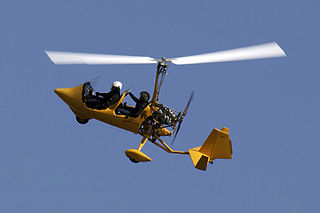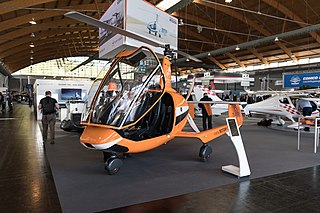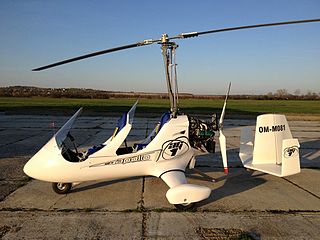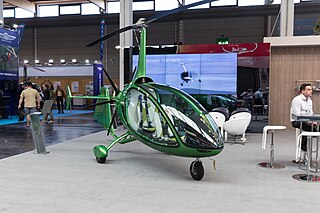
The Pitcairn PA-34 and Pitcairn PA-33, given the United States Navy (USN) designation Pitcairn OP-2 and United States Army designation Pitcairn YG-2 respectively were reconnaissance autogyros designed and built in 1936 for evaluation.

The AutoGyro Calidus is a German autogyro, designed and produced by AutoGyro GmbH of Hildesheim. The aircraft is supplied as a complete ready-to-fly-aircraft.

The AutoGyro MT-03 is a German autogyro, designed and produced by AutoGyro GmbH of Hildesheim. The aircraft is supplied as a complete ready-to-fly-aircraft.
The Bauer BAD-12 Gyrotrainer is a Czech autogyro, designed and produced by Bauer Avion of Prague. The aircraft is supplied as a complete ready-to-fly-aircraft.
The Butterfly Monarch is an American autogyro, designed and produced by The Butterfly LLC of Aurora, Texas. The aircraft is supplied as a kit for amateur construction.

The ELA 07 is a series of Spanish autogyros, designed and produced by ELA Aviación of Córdoba, Andalusia. The aircraft are supplied complete and ready to fly.

The Pagotto Brakogyro is a series of Italian autogyros, designed by Enio Pagotto and produced by Carpenterie Pagotto of Pianzano. The aircraft is supplied as a complete ready-to-fly-aircraft.

The Trixy G 4-2 R is an Austrian autogyro, designed and produced by Trixy Aviation Products of Dornbirn. The aircraft was introduced at the Aero show held in Friedrichshafen in 2011 and when it was available it was supplied as a complete ready-to-fly-aircraft.

The Rotorvox C2A is a two-seat, pusher configuration autogyro developed in Germany.

The ELA Aviation ELA 10 Eclipse is a Spanish, two-seat, enclosed autogyro, designed and built by ELA Aviación of Córdoba, Andalusia. It was introduced at the AERO Friedrichshafen airshow in 2014. The aircraft is supplied complete and ready-to-fly.

The Apollo Gyro AG1 is a Hungarian autogyro produced by Apollo Ultralight Aircraft of Eger and introduced in 2012. The aircraft is supplied ready-to-fly.
The Aviomania G2SA Genesis Duo is a Cypriot autogyro designed in 2007 by Nicolas Karaolides and produced by Aviomania of Larnaca. The aircraft is supplied as a complete ready-to-fly-aircraft or as a kit for amateur construction.
The Aviomania G1SA Genesis Solo is a Cypriot autogyro that was designed by Nicolas Karaolides and produced by Aviomania of Larnaca. Now out of production, when it was available the aircraft was supplied as a complete ready-to-fly-aircraft or as a kit for amateur construction.

The ELA 09 Junior is a Spanish autogyro designed and produced by ELA Aviación of Córdoba, Andalusia, introduced in the mid-2010s. The aircraft is supplied complete and ready-to-fly.
The Freewind Bumble B (transl. Bumblebee) is a French autogyro that was designed and produced by Freewind Aviation of Vimory, introduced in about 2013. Now out of production, when it was available the aircraft was supplied complete and ready-to-fly.

The Niki Kallithea is a Bulgarian autogyro designed and produced by Niki Rotor Aviation of Pravets, introduced in 2011. The aircraft is supplied complete and ready-to-fly.
The SkyCruiser Autogyro SkyCruiser is a series of Hungarian autogyros designed and produced by SkyCruiser Autogyro KFT of Inárcs. It was publicly introduced at the AERO Friedrichshafen airshow in 2014. The aircraft is supplied complete and ready-to-fly.
The Titanium Explorer is an Australian autogyro designed by Neil Sheather and Andrew Pepper and produced by Titanium Auto Gyro of Attunga, New South Wales. The aircraft is supplied complete and ready-to-fly, although development of a kit for amateur construction was underway in 2015.

The Trixy Princess is an Austrian autogyro designed and produced by Trixy Aviation Products of Dornbirn. The aircraft is supplied complete and ready-to-fly.
The Trixy Eye is an Austrian tandem-seat autogyro designed and built by Trixy Aviation Products intended for police and military operators for the observation and reconnaissance roles.












